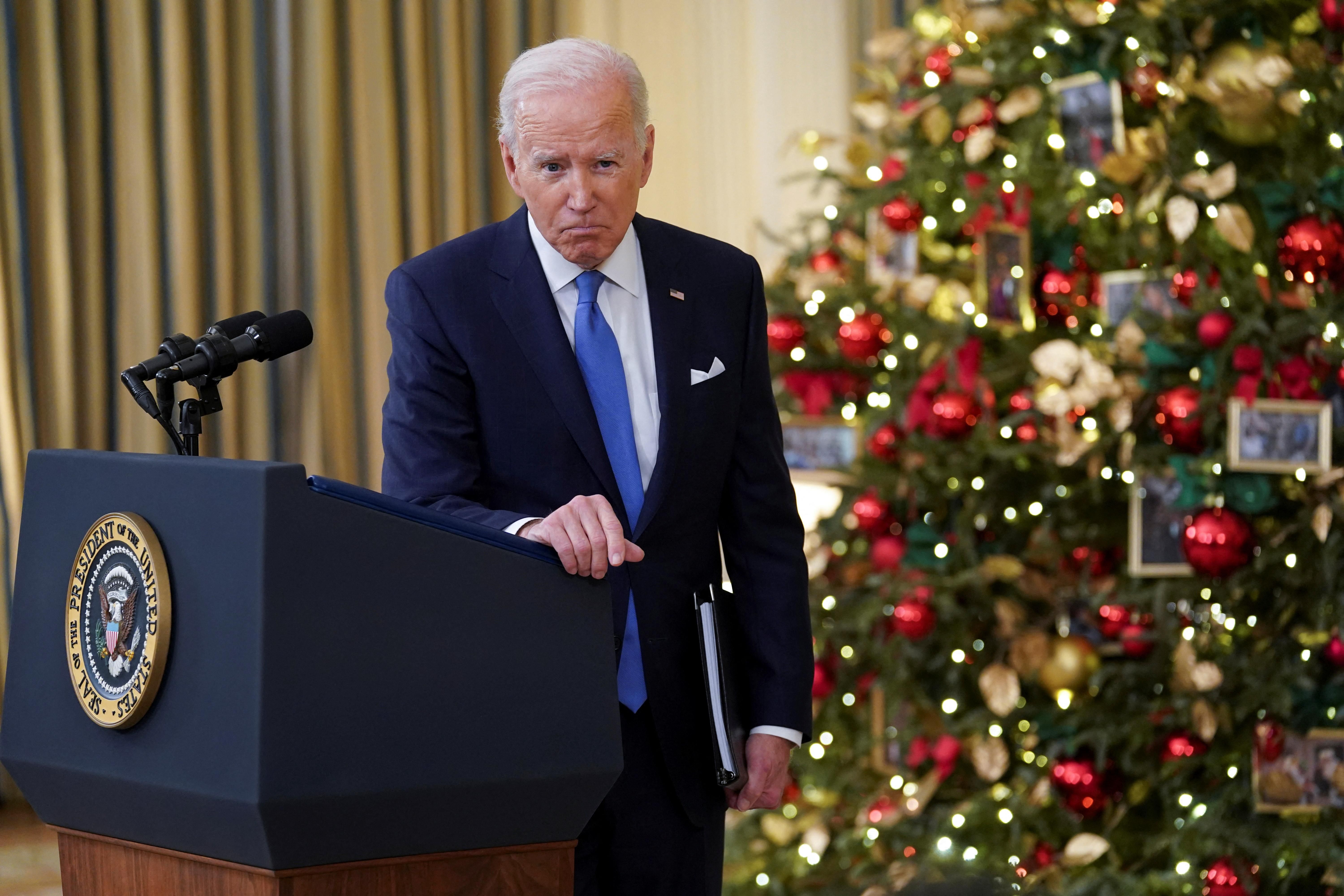What We’re Watching: Biden’s omicron message, Ukraine invasion rumblings, Haitian migrants sue US, China hearts US natural gas
Biden’s omicron message to America. It’s fair to assume that many Americans were anxious to hear what President Biden had to say at a presser Tuesday about the omicron variant ripping through US cities. So what did the commander-in-chief tell the huddling masses? First, he stuck to the White House script, reiterating that vaccinations, boosters, and masks are crucial to minimizing risk from omicron. Second, he reassured parents that schools will stay open despite the surge. There’s other good stuff in the works too: 1,000 military personnel will be deployed to help strained hospitals, and the government will purchase half a billion COVID tests that Americans will be able to order to their homes for free. That’s great, but this scheme won’t be ramped up until January, several weeks into a surge that many analysts say was highly predictable and that the White House should have prepared for. Current testing failures have been particularly problematic in hard-hit New York City, where cases have risen 80 percent in two weeks. But the Biden administration has still failed to offer guidance for 15 million Americans who received an initial single-dose Johnson & Johnson shot, which scientists say doesn’t offer much protection against omicron. Biden’s message was clear: this isn’t March 2020, go celebrate the holidays with your families. But did he convince millions of very worried Americans?
US-Russia standoff: Rattling or Rolling? Vladimir Putin said on Tuesday that if NATO continues to be “obviously aggressive” in Ukraine, the Kremlin would respond with unspecified “military-technical means,” stressing that Russia’s sovereignty is at stake. On the same day, his Defense Minister warned that the US was planning a false flag chemical weapons attack in Ukraine. For a while now, Russian state TV has been riling up nationalist sentiment in evening news monologues. That all seems bad… And yet it seems that beneath the headline fury, diplomacy is slowly wheeling onwards. The US and Russia are set for bilateral talks in January, and there will be NATO-Russia and Russia-EU engagements alongside that. Those talks will focus on what, precisely, Putin is doing with the 100,000 troops he’s massed along the Ukrainian border, and whether there is any agreement to be teased out on the basis of the Kremlin’s recently-released list of maximalist demands from NATO. Those demands would all but turn back the clock to 1997, before NATO expanded into the former Soviet sphere, and deny the right of countries in Eastern Europe to join the alliance if they wish. Those are non-starters for the alliance, but the demands seem to have been an opening position rather than a final one. The US and EU are still threatening to impose crippling economic and financial sanctions on Russia if Moscow does decide to invade Ukraine again. This story will be a big one in January. Hopefully no holiday surprises.
Haitian asylum-seekers vs US government. You might recall these confronting images of US border agents on horses in the Texas border town of Del Rao, using their reins as whips to corral Black migrants trying to enter the US from Mexico. Now a group of Haitian asylum-seekers has filed a lawsuit against the US government for poor treatment and denial of due process, accusing the Biden administration of unfairly keeping in place a Trump-era policy of expelling most migrants on elastic public health grounds. The plaintiffs also say they weren’t given enough food and water while in the US’ care. The accusers, who were deported, are requesting that they be allowed to stay in the US while their applications are processed. Central American migrants have been arriving at the US southern border in record numbers this year because of pandemic-related economic hardships – as have Haitians who are trying to flee a collapsing state. Immigration has been a lightning-rod issue for President Biden during his first year: while most Americans support his tough-on-border approach, it has alienated progressives, a key part of his broad constituency.
China bullish on American natural gas. Even though the US and China continue to clash over broader trade issues, Chinese energy giants are buying a lot of liquified natural gas from America lately. Since October, Chinese energy firms have signed seven big deals to purchase LNG from US suppliers, suggesting that energy is another area — apart from climate — where the world's two largest economies can still scratch each other's back. (The US will next year become the world's top LNG exporter, while China is expected to surpass Japan as the number one importer by the end of the decade.) What's more, Chinese companies are purchasing American LNG at a 25-percent premium due to China’s retaliatory tariffs against US natural gas. Still, US Sen. Elizabeth Warren wants to restrict LNG exports to curb rising natural gas prices in the US. American natural gas execs, for their part, warn that'll be bad for the climate because many countries are looking to replace coal-fired electricity plants with plants powered by natural gas. The latter emit less carbon dioxide than burning coal, but leak methane, which warms the planet way faster.